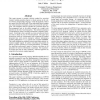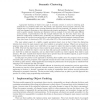18 search results - page 1 / 4 » Object Fault Handling for Persistent Programming Languages: ... |
OOPSLA
1993
Springer
13 years 10 months ago
1993
Springer
A key mechanism of a persistent programming language is its ability to detect and handle references to non-resident objects. Ideally, this mechanism should be hidden from the prog...
VLDB
1992
ACM
13 years 10 months ago
1992
ACM
This paper presents a portable, efficient method for accessing memory resident persistent objects in virtual memory in the context of the E programming language. Under the approac...
SOSP
1993
ACM
13 years 7 months ago
1993
ACM
Many operating systems allow user programs to specify the protectionlevel (inaccessible, read-only, read-write) of pages in their virtual memory address space, and to handle any p...
POS
1992
Springer
13 years 10 months ago
1992
Springer
Persistent programming systems are generally supported by an object store, a conceptually infinite object repository. Objects in such a repository cannot be directly accessed by u...
POS
1990
Springer
13 years 10 months ago
1990
Springer
Appropriate clustering of objects into pages in secondary memory is crucial to achieving good performance in a persistent object store. We present a new approach, termed semantic ...



